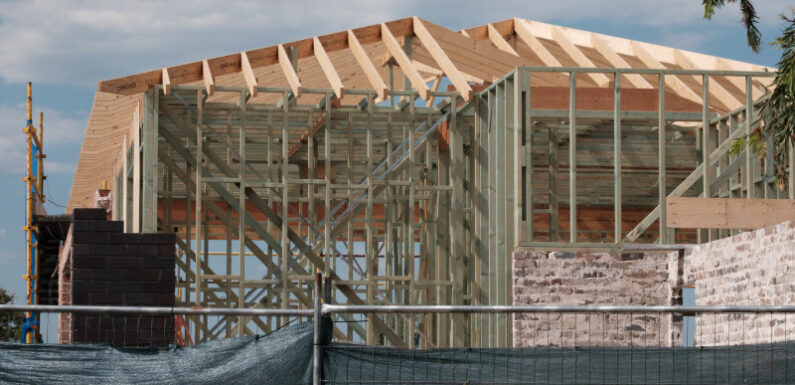
Save articles for later
Add articles to your saved list and come back to them any time.
Property taxes would more than triple in coming years for developers who fail to build on small vacant lots, according to research commissioned by construction companies that found the state government’s proposal would discourage residential builds instead of relieving the housing crisis.
Victorian Treasurer Tim Pallas insists he does not want to raise revenue but change behaviour by spurring development of new homes rather than land banking, which local governments and experts agree suppresses housing supply.
The research found property taxes will discourage development of new homes.Credit: Oscar Colman
Pragmatic Policy Group lead economist Oliver Browne found landowners who have not developed their residential lot would be charged an extra $6225 a year for land worth $500,000 — a 263 per cent increase in property tax between 2022 and 2026 — if the government bill passes state parliament.
That tax hike came in two hits, one being the “temporary” 10-year COVID-19 levy to increase land tax announced in the May state budget. But the majority — $5000 — can be blamed on the proposed expansion of the vacant residential land tax.
Browne, a former chief policy adviser to then-federal treasurer Wayne Swan, said it would cost an extra $11,725 a year for undeveloped land worth more than $1 million, or $64,675 for sites valued at $5 million.
“I just find it very hard to see how these astonishingly large tax increases are going to increase the supply of housing. I believe they’ll do the exact opposite,” Browne told The Age.
He argues the threat of being burdened with the tax penalties will drive developers to look for land elsewhere, and if they stick with Victoria, costs would ultimately be passed onto homebuyers.
“I’d say nine times out of 10, a home builder will say, ‘we’ll stop building here, and we’ll go and build in the outer suburbs of Sydney instead’,” Browne said.
The tax, if it passes the upper house as drafted, would apply from 2026 on undeveloped residential land in Melbourne that hasn’t been improved for five years. A further two-year extension applies if a building permit has been granted.
Pallas – announcing the vacant residential land tax expansion at a corporate breakfast last month to swift condemnation from the sector – estimated it would bring in $31 million a year.
RMIT Emeritus Professor Michael Buxton dismissed concerns an undeveloped land tax would discourage residential builds. He said land banking was a genuine problem in Melbourne.
“It’s been identified as an issue for a very long time,” Buxton said. “There’s been a long-standing practice for developers to get planning approval for permits and then to sit on them for a while and then sell them for a higher profit.”
The Municipal Association of Victoria, the peak body for local governments, estimates there are 120,000 homes across the state yet to be built despite approved planning permits. There were 53,000 building approvals in the 12 months to September, compared to 71,000 the year prior, the Department of Transport and Planning told parliament’s budget estimates on Wednesday.
Labor’s bill has stalled in the upper house without the necessary support from the opposition or crossbench.
Two sources with knowledge of discussions, unable to speak publicly, confirmed the government asked the Property Council to bring the state opposition to the table to negotiate. If not, Labor would work with the Greens on amendments to secure the minor party’s support and create a bill the property sector would find less palatable.
Buxton agreed the government’s bill may have unintended consequences and said more policy levers were needed, particularly while construction was suffocated by labour and supply chain shortages as well as inflation.
As it stands, he said Victoria was unlikely to achieve its aim of building an extra 80,000 homes a year.
Cath Evans, Victorian executive director of the Property Council, said facilitating residential development at scale should be the foremost priority for all governments and blamed delays in the planning system for land left undeveloped.
“We do not believe that the expansion of the vacant residential land tax, particularly the currently drafted provisions for including undeveloped land, does anything to improve housing supply. If anything, it provides a disincentive to developers to take the risk on projects in Victoria,” she said in a written statement to The Age on Thursday.
A government spokesman said existing exemptions for the vacant residential land tax would continue, but that it had successfully returned unoccupied homes to the market in Melbourne and should be expanded to increase supply.
“We know the only way to improve housing affordability is to increase supply and this is about providing Victorian families, couples and individuals with more options,” he said.
Start the day with a summary of the day’s most important and interesting stories, analysis and insights. Sign up for our Morning Edition newsletter.
Most Viewed in Politics
From our partners
Source: Read Full Article
